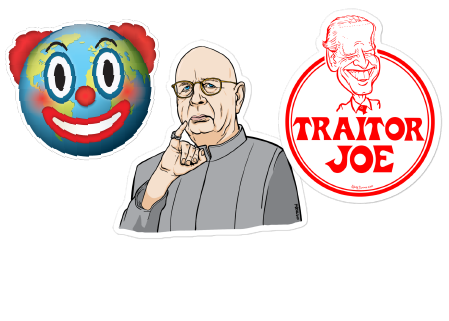Browse Categories
Add description, images, menus and links to your mega menu
A column with no settings can be used as a spacer
Link to your collections, sales and even external links
Add up to five columns
Add description, images, menus and links to your mega menu
A column with no settings can be used as a spacer
Link to your collections, sales and even external links
Add up to five columns
Your Chinese Shit from Amazon Isn’t from Free Trade
November 18, 2024 10 min read

Hey man,
We need to talk. Not about your politics, your workout regimen, or that five-in-one air fryer/waffle maker/mist diffuser you just got on Amazon for $19.99. No, this is deeper than that. You’re hooked. Addicted. And I know because I was too. The packages stacking up on the porch, the thrill of tearing open that cardboard box like it’s Christmas morning, the smug satisfaction of scoring a Bluetooth speaker for less than the price of a cup of coffee—it’s intoxicating.
It feels like freedom, doesn’t it? Capitalism at its finest. Global trade doing what it does best: delivering cheap goods and fast gratification. It’s an invisible hand patting you on the back. But let me hit you with a truth bomb: that mountain of shiny, plastic crap on your doorstep isn’t freedom’s crowning achievement. It’s not capitalism’s purest form. And it’s definitely not free trade.
What it is, my friend, is a gigantic scam—a system so intricately rigged you don’t even realize you’re the mark.
Now, don’t get defensive. I’m not here to guilt-trip you or yank that cheap smartwatch off your wrist. But we’ve got to talk about what’s really going on behind the scenes of those incredible deals. Because here’s the thing: your Chinese shit from Amazon is only “cheap” because someone else is paying the bill—and chances are, that “someone” is you.
The Bargain That Wasn’t
You ever get the feeling that those incredible deals on Amazon are a little too good to be true? Like, sure, you’re the proud owner of a $10 Bluetooth speaker that somehow also functions as a flashlight, a power bank, and a white noise generator. But deep down, you have to wonder—how the hell is this even possible? Let me tell you: it’s not because the free market waved its magical invisible hand and delivered you a miracle of efficiency. Nope. It’s because the Chinese government decided to pick up the tab, and the rest of us—American workers, innovators, taxpayers, and even the planet—are footing the bill.
See, the Chinese government has a funny idea of competition. It’s not about building a better mousetrap or outsmarting the competition. It’s about rigging the game so thoroughly that the other players don’t even know they’ve lost until they’re packing up their factories and filing for bankruptcy. Subsidies, tax breaks, forced technology transfers, and logistical tricks—they’ve got a whole bag of dirty tricks designed to make Chinese products unbeatable, not because they’re better, but because they’re cheaper than dirt.
Let’s start with subsidies. You’ve probably heard the term thrown around, but let me paint you a picture. Imagine you’re running a lemonade stand, trying to make an honest buck. Across the street, your competitor is getting free lemons, sugar, cups, and labor, all courtesy of the local government. Not only that, but the government is paying them a bonus for every glass they sell—oh, and they also own the street and the stand. How long do you think you’d last in that scenario? That’s what Chinese manufacturers are doing to the rest of the world. State-owned enterprises—giant corporations that operate not on profit but on political will—are bankrolled with endless loans they’ll never have to repay and export rebates that make dumping goods onto foreign markets as easy as stealing candy from a baby. And boy, do they dump. Steel, electronics, textiles, solar panels—you name it, they’re flooding the market with it at prices no one else can compete with (IMF Report, USTR Report).
But it doesn’t stop there. Let’s talk about forced technology transfers—because why innovate when you can just take someone else’s hard work? If you’re a foreign company and you want to sell your widgets in China, you’d better be ready to play by their rules. And by “rules,” I mean handing over your blueprints, trade secrets, and proprietary tech. Tesla, for instance, didn’t just waltz into China and start cranking out cars. Nope, they had to partner with local suppliers and share their battery technology—technology that’s now mysteriously popping up in competing products (IP Commission Report).
And while Chinese manufacturers are playing dirty, the rest of us are playing by the rules. American companies trying to sell in China face a gauntlet of tariffs, quotas, and bureaucratic red tape. Meanwhile, Chinese goods roll into the U.S. like they own the place, with nary a tariff or regulatory hurdle to slow them down. Take cars, for example. For years, China slapped a 25% tariff on imported vehicles while flooding our market with cheap knockoffs (USTR Review).
Then there’s the shipping game. You’d think getting a $5 kitchen gadget from Guangdong to your doorstep would cost more than, say, a sandwich at Subway, but you’d be wrong. China’s government not only subsidizes its shipping industry but also builds the ports, funds the infrastructure, and provides the logistical support to make sure their goods travel the globe for pennies on the dollar. It’s like running a marathon and having a personal chauffeur drive you from mile marker to mile marker while your competitors are stuck on foot (China Briefing Analysis).
So, let’s dispense with the fantasy that this is just good old-fashioned capitalism at work. It’s not. It’s a rigged system, designed to crush competition, steal innovation, and flood the planet with cheap, disposable junk. And yet, there are those who’ll still argue that this is “free trade,” as if slapping the label on it makes it true. But here’s the thing: trade only works when everyone’s playing by the same rules. Otherwise, it’s not trade. It’s exploitation, plain and simple.
And let’s not forget the cost of all this “cheap” stuff. It’s not just the jobs lost, the factories shuttered, or the innovation stifled. It’s also the price we pay in environmental degradation and the hollowing out of our own economies. China is the world’s largest polluter, responsible for nearly a third of global carbon emissions, not to mention the mountains of plastic waste choking our oceans (World Bank, WRI Analysis). Every time you click “Add to Cart,” you’re not just buying a product—you’re buying into a system that’s poisoning the planet, robbing workers, and undermining the very principles of fair competition.
So next time you marvel at the price of that $10 desk fan, ask yourself: Who’s really paying for it? Because I guarantee you, it’s not just the guy in Shenzhen who made it. It’s all of us, in ways that are far more expensive than we realize.
The Consequences of a Rigged System
Here’s the thing about a rigged game—it doesn’t just affect the players directly involved. The ripple effects spread everywhere, warping the economy, undermining innovation, and leaving communities hollowed out. When the Chinese government props up its manufacturers and floods global markets with subsidized goods, it creates a cascade of consequences that go far beyond the bargain bin prices we’ve come to expect.
Let’s talk about jobs. Once upon a time, America made things. Real things—cars, appliances, furniture. You could walk into a factory straight out of high school, learn the ropes, and walk out with a paycheck big enough to buy a home, raise a family, and send your kids to college. Those days are gone. And it’s not because we suddenly forgot how to innovate or compete. It’s because we’re competing against a system designed to make sure we lose.
When Chinese companies sell steel, electronics, or textiles at prices no one else can match, American factories can’t keep up. Between 2001, when China joined the World Trade Organization, and 2018, the U.S. lost 3.7 million manufacturing jobs. That’s not just a number—that’s towns gutted, families displaced, communities left to rot. (Economic Policy Institute) And no, those jobs didn’t magically transform into high-tech positions or service jobs with comparable pay. They just vanished, leaving behind a workforce scrambling for whatever gig work or low-wage retail jobs they could find.
But it’s not just about jobs. Let’s talk about innovation—or, more specifically, the lack of it. The beauty of a competitive market is that it forces companies to innovate. Build a better product, find a more efficient way to do things, or get left behind. But when your competition is propped up by government subsidies, innovation takes a back seat to survival. Why invest in research and development when you’re just trying to keep the lights on? Meanwhile, Chinese companies aren’t just competing—they’re stealing. Intellectual property theft costs the U.S. economy hundreds of billions every year. That’s money that could be spent on creating the next big thing but is instead spent on lawyers and lawsuits. (IP Commission Report)
And then there’s the environment. China’s rise as the world’s manufacturing hub has come at an enormous cost to the planet. Their factories pump out cheap goods and toxic emissions in equal measure. China is responsible for nearly 30% of global carbon dioxide emissions. Its cities are shrouded in smog so thick it’s been likened to a “nuclear winter,” while its rivers run black with industrial waste. (World Resources Institute) And plastic? Don’t even get me started. China is the single largest contributor to oceanic plastic pollution, dumping millions of tons of waste into the sea every year. (World Bank)
But hey, at least we’re saving a few bucks on phone cases and kitchen gadgets, right?
It’s easy to ignore these consequences when they’re happening out of sight. After all, the factory closures and environmental devastation are thousands of miles away. The jobs lost are someone else’s problem. The smog is on the other side of the world. But just because we don’t see it doesn’t mean we’re not part of it. Every time we buy another $15 gadget, we’re participating in a system that prioritizes short-term bargains over long-term sustainability, both economic and environmental.
So, let’s not kid ourselves. That $10 desk fan isn’t just a great deal. It’s a symptom of a system that’s broken in ways that go far beyond your bank account. It’s jobs lost, innovation stifled, and a planet pushed closer to the brink. And while we’re busy marveling at the bargains, the cost keeps piling up—for all of us.
Now what?
So here we are, standing knee-deep in cheap goods, crumbling industries, and polluted oceans, wondering how it got this bad. It’s easy to feel helpless. After all, this is a system engineered by global powers, billion-dollar corporations, and state-backed behemoths. What can one person do? The good news is, quite a bit. But first, we have to take a long, hard look at the choices we make, both as consumers and as a nation.
Let’s start with us, the consumers. Yes, I know—it feels good to snag a bargain. We’ve been trained to see a low price as a victory, a symbol of our purchasing savvy. But that $10 fan? That $15 gadget? They’re not just great deals—they’re decisions. Every time we click “Add to Cart,” we’re casting a vote for the kind of economy, society, and planet we want. So maybe the next time you’re tempted by that too-good-to-be-true price, think about where it comes from and what it costs. Buy local when you can. Support businesses that play fair. It’s not about being perfect; it’s about being mindful.
But let’s be real—individual action can only go so far. If we’re going to fix this system, we need to get serious about policy. That doesn’t mean turning our backs on free trade or embracing protectionism wholesale. It means leveling the playing field. It means enforcing trade rules and holding countries like China accountable when they break them. Filing complaints with the World Trade Organization (WTO) about subsidies and dumping is a good start, but it’s not enough. We need to impose countervailing duties on subsidized imports, strengthen intellectual property protections, and make it clear that forced technology transfers are unacceptable.
And yes, that means tariffs. Not across the board, but targeted measures that address specific abuses—like subsidies, dumping, and IP theft. Tariffs aren’t the enemy of free trade; they’re a tool to ensure it works as intended. Critics will scream about higher prices, but let’s put things in perspective. A slightly more expensive smartphone is a small price to pay for a system that doesn’t destroy industries so that our population needlessly races to the bottom.
You can be 100% free trade and still recognize that countries like China are fucking us and do something about it, just as you can 100% be for peace but defend yourself from invasion.
We also need to rethink how we protect our strategic industries. China doesn’t just subsidize steel and solar panels—it’s investing heavily in AI, semiconductors, and energy technologies. If we’re not careful, we’ll wake up one day and find that we’re not just dependent on them for cheap consumer goods but also for the technologies that power our economy and our military. That’s not just bad economics—it’s a national security risk. It's already a huge problem.
And then there’s the environment. If we want to address the environmental cost of China’s manufacturing dominance, we need to lead by example. That means pushing for international agreements on carbon emissions, holding polluters accountable, and investing in sustainable technologies that can compete on a global scale. It’s not enough to wag our fingers at China while turning a blind eye to our own practices.
But none of this will happen without public pressure. The companies making billions off this rigged system have no incentive to change, and neither do the politicians they lobby. That’s where we come in. We need to demand better—from our leaders, from our corporations, and from ourselves. Because this isn’t just about cheap goods or trade deficits. It’s about what kind of world we want to live in.
The next time you see that Amazon deal that’s almost too good to be true, remember this: it probably is. And the cost isn’t just the dollars you save—it’s the jobs lost, the innovation stifled, and the planet polluted. We can’t buy our way out of this mess. But with the right policies, the right priorities, and a little bit of effort, we can start to fix it.
All the best,
Dan
Sources List
IMF Report. Trade Implications of China's Subsidies. International Monetary Fund. Available at: https://www.imf.org/en/Publications/WP/Issues/2024/08/15/Trade-Implications-of-China-s-Subsidies-552506
South China Morning Post. China’s Industrial Subsidies: What Are They and Why Are They Important?. Available at: https://www.scmp.com/economy/china-economy/article/3167588/chinas-industrial-subsidies-what-are-they-and-why-are-they
China Briefing. Export Tax Rebates in China: Recent Changes and Risk Management. Available at: https://www.china-briefing.com/news/export-tax-rebates-in-china-recent-changes-and-risk-management/
IP Commission Report. The Cost of Intellectual Property Theft. Available at: Commission on the Theft of American Intellectual Property | The National Bureau of Asian Research (NBR)
World Bank. Reducing China’s Plastics Pollution. Available at: https://www.worldbank.org/en/news/press-release/2021/06/24/reducing-china-s-plastics-pollution
World Resources Institute. China and Global Emissions: Insights from WRI Analysis. Available at: https://www.wri.org/insights/4-charts-show-how-much-chinas-climate-policies-have-made-difference-so-far
USTR Review. China’s Trade Practices: U.S. Trade Policy Review. United States Trade Representative. Available at: https://ustr.gov/about-us/policy-offices/press-office/press-releases/2021/october/us-statement-trade-policy-review-china
Council on Foreign Relations (CFR). Sea Power, U.S. Navy, and Global Trade. Available at: https://www.cfr.org/backgrounder/sea-power-us-navy-and-foreign-policy
Economic Policy Institute (EPI). China Trade, Outsourcing, and Jobs. Available at: https://www.epi.org/publication/china-trade-outsourcing-and-jobs/
Leave a comment
Also in The New Remnant
The Asylum Game Is Rigged—and This Poor Bastard Is Just Another Pawn
April 15, 2025 2 min read
The U.S. asylum system isn’t broken by accident—it’s a rigged game of exploitation, lies, and political theater. This case proves it’s not about compassion. It’s about control. And the poor bastard at the center? Just another pawn.
Recent Articles
- The Asylum Game Is Rigged—and This Poor Bastard Is Just Another Pawn
- Open-Source Anarchy: How DeepSeek Upended the AI Power Game
- The Dark Psychology Behind Anti-Capitalist Hate
- Your Chinese Shit from Amazon Isn’t from Free Trade
- Mayor Pete Buttigieg's Dad Devoted His Life to the Italian Theorist Who Plotted the Communist Conquest of the West
- The Untethered Executive
Collections
- Top Tees
- New
- Stickers
- SALE
- Humor
- Banned Stuff
- Vintage & Historical
- Political History Shop
- Hats
- Triblends
- Home and Living
- Wall Art
- Mugs and Drinkware
- Pop Culture
- Politics
- Slogan Tees
- Elections
- Libertarian
- Dirty Jokes
- Great Minds
- Patches
- Bags
- Kids
- Towels
- Swimwear
- Masks
- Phone Cases
- Tech Accessories
- Athletic
- Flags
- The Latest
- Wishlist
Sections You Might Like
Subscribe
Sign up to get the latest on sales, new releases and more …









